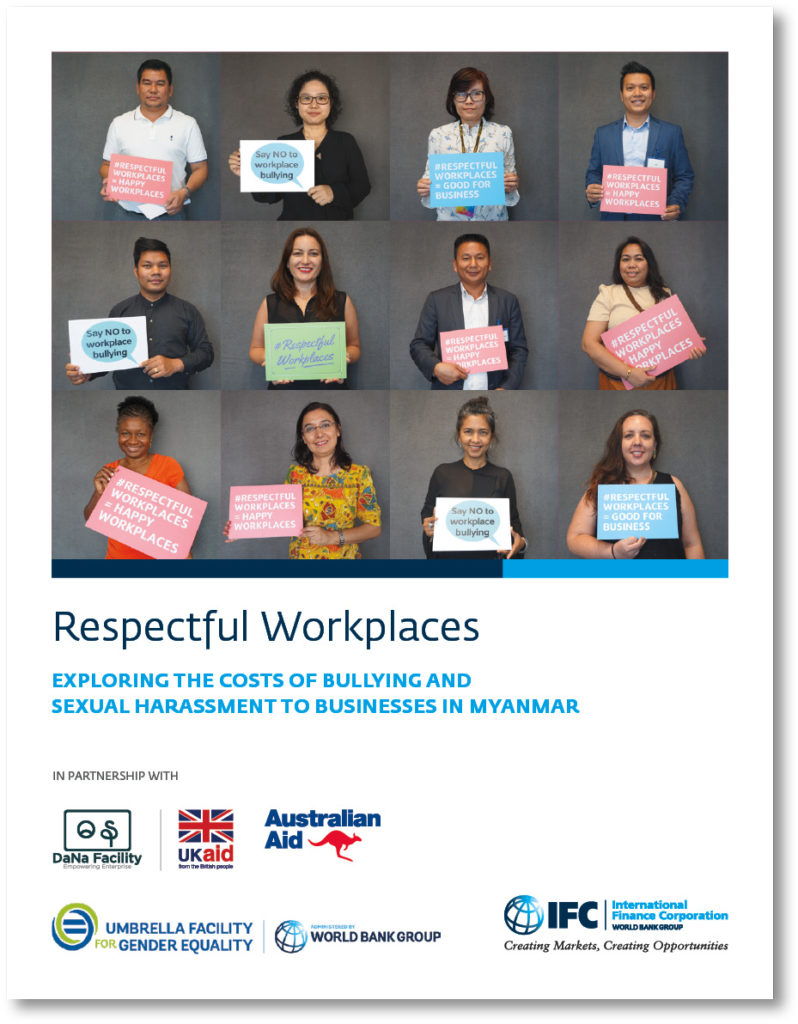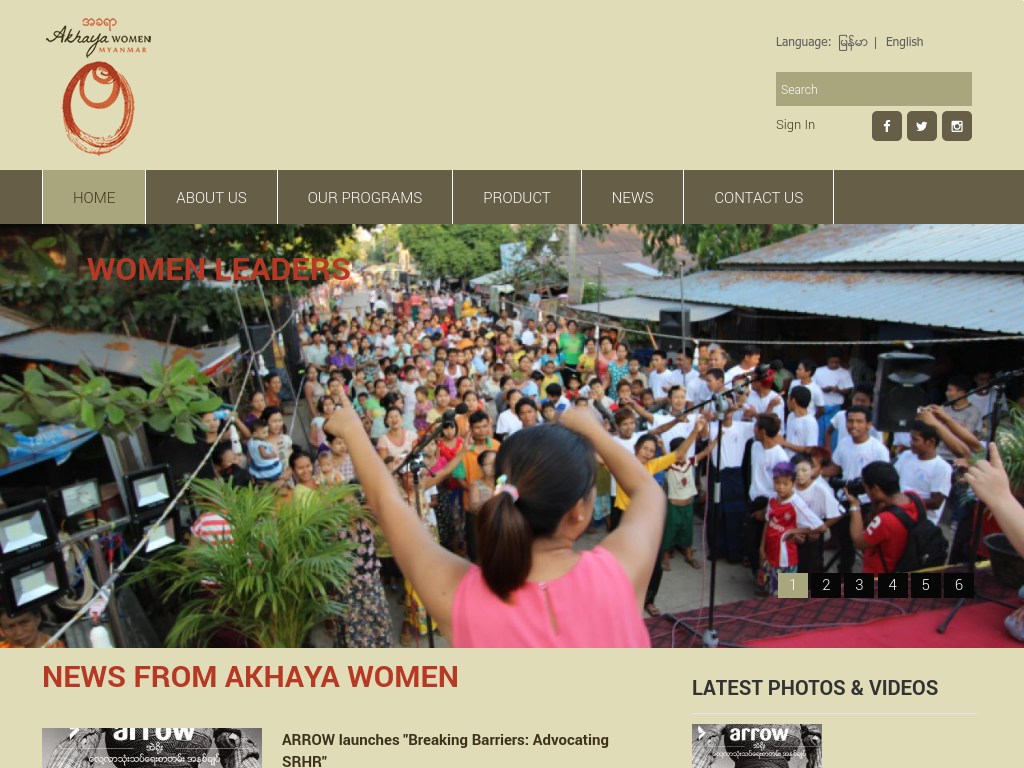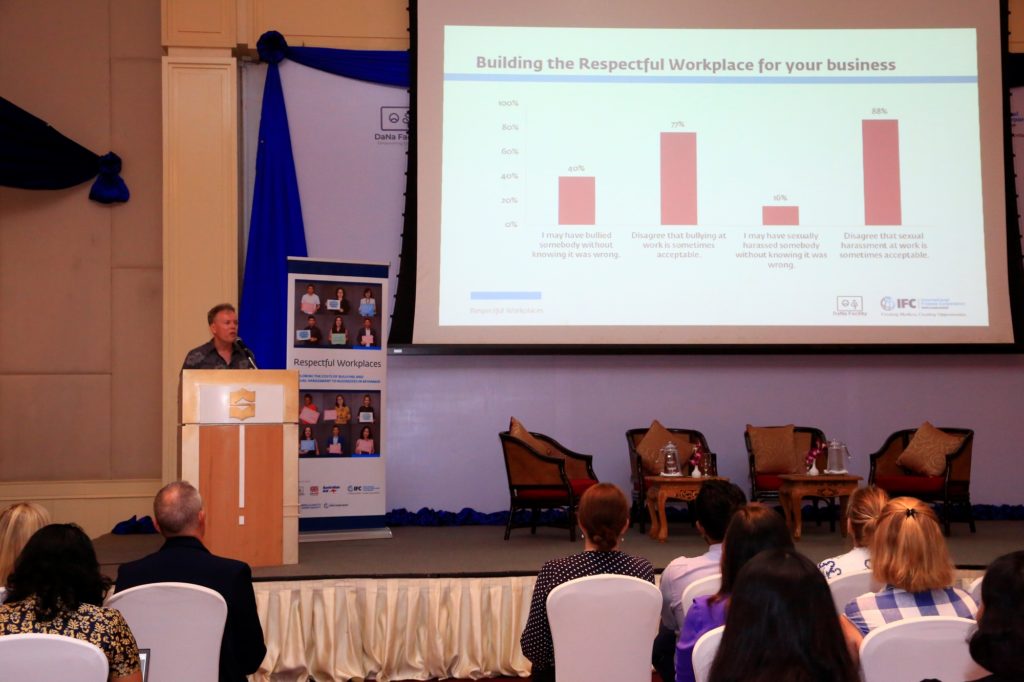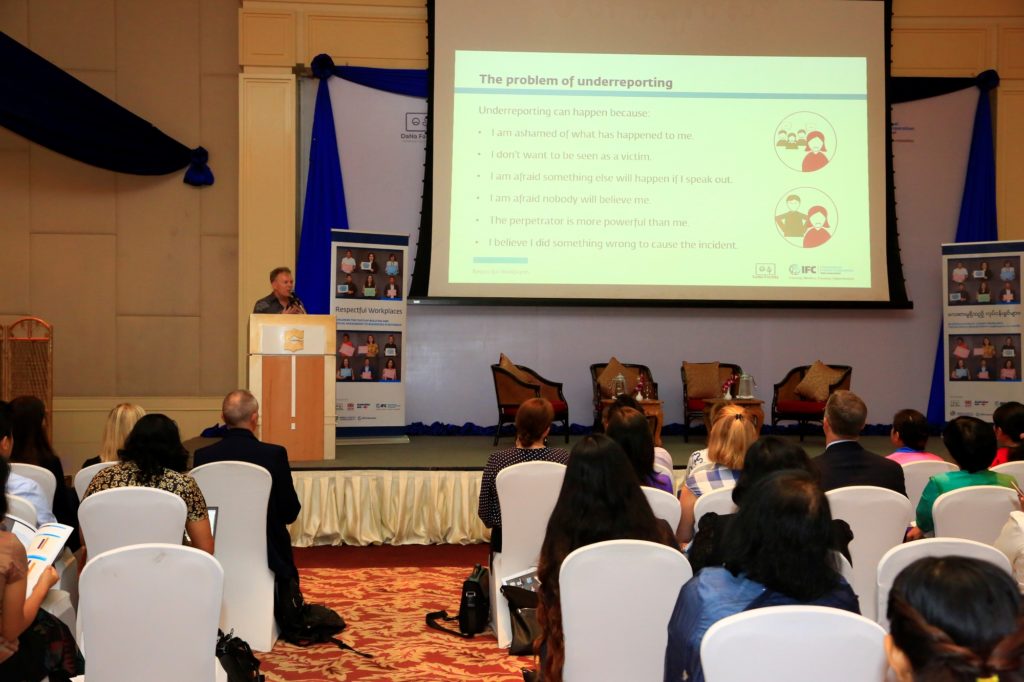Category: Gender based violence
Launch of GBV good practice note for the private sector

Private sector companies and investors are increasingly starting to recognise gender-based violence and harassment (GBVH) as serious issues they need to address. Investors are becoming increasingly reluctant to fund projects where these types of risks have not been adequately assessed and mitigated. Companies are at risk of litigation, reputational damage and productivity impacts if incidents of GBVH occur within the workplace or within communities where an employee or contractor might be involved.
GBVH is widespread. It affects both men and women, but is most often perpetrated by men against women and girls, with more than one in three women having experienced some form of physical or sexual violence during their lifetime.
The good practice note provides much-needed guidance for companies and investors on how to mitigate the adverse impacts of GBVH on survivors and on companies and investors. It is intended to help companies and investors to assess, prevent, respond to and monitor GBVH. Importantly, the good practice note will help readers to identify common safety risks and ethical pitfalls where specialist GBVH expertise may be required.
The note was jointly commissioned by CDC Group, the European Bank for Reconstruction and Development (EBRD) and International Finance Corporation (IFC). Factive’s Principal Consultant, Dean Laplonge, and our GBV Specialist, Laura Marchesini, were pleased to be able to contribute feedback and guidance during the development of this note. Factive has worked extensively with IFC and EBRD on the development of their GBVH risk assessment and mitigation strategies over recent years.
A copy of “Addressing Gender-Based Violence and Harassment: Emerging Good Practice for the Private Sector” can be downloaded from any of the following pages:
IFC recruiting for GBV consultant for research in Papua New Guinea
International Finance Corporation (IFC) is seeking a researcher/M&E specialist to evaluate the impact of workplace responses to family and sexual violence (FSV) in PNG from FY20-22. FSV disproportionately affects women and is a key contributing factor to the wide and slow-to-close gender gaps in the Pacific region. The data and analysis derived from this project are expected to increase the number of private sector firms in PNG taking proactive steps to support staff impacted by FSV.
The objective of this assignment is to provide M&E support to IFC on measuring the business case for workplace responses to FSV in PNG. The terms of reference for this role can be downloaded from the following link:
New study finds attitudes towards domestic and sexual violence are changing in Solomon Islands

A new report has been released on The Impact of Domestic and Sexual Violence on the Workplace in Solomon Islands. The International Finance Corporation (IFC) study finds domestic and sexual violence to be pervasive, recent and regular, to have a profound impact on employee well-being, and create substantial costs to businesses.
Encouragingly, however, the study found that attitudes towards domestic and sexual violence are changing. There are much lower levels of acceptance of violence today, compared to previous studies.
The report was produced by IFC in collaboration with the Solomon Islands Chamber of Commerce and Industry, SICCI, the peak representative body for the private sector in Solomon Islands.
If you are interested in this topic, you may be interested to listen to a recent podcast interview with Shabnam Hameed, one of the authors of the report. In the podcast, Shabnam discusses IFC’s work with the private sector to address domestic and sexual violence as a workplace issue.
Workplaces free from bullying and sexual harassment are good for business

Factive is pleased to announce the official launch of the report: Respectful Workplaces: Exploring the Costs of Bullying and Sexual Harassment to Businesses in Myanmar.
The study was carried out by the Factive team in Myanmar on behalf of International Finance Corporation (of the World Bank Group) and DaNa Facility between September and November in 2018 to understand the experiences of employees relating to bullying and sexual harassment in Myanmar workplaces. There were 39 participating organisations, including 26 large businesses in the agribusiness, finance, retail and tourism sectors.
Some of the key findings of the report:
- Sexual harassment affects all workplaces. 21 percent of employees said they had witnessed an incident of sexual harassment in their current workplace.
- Bullying is more common than sexual harassment. More than half of the employees said they had witnessed an incident of bullying.
- Bullying and sexual harassment are a significant cost to business. On average, the study found businesses experience a 14% loss to labor productivity due to presenteeism caused by bullying and sexual harassment.
- Businesses are not adequately prepared to respond. Very few businesses had formal policies and procedures in place. The vast majority of employees do not report incidents of sexual harassment and bullying. Instead, they ignore them or discuss them on social media.
- Bullying and sexual harassment are workplace culture issues that can be addressed. There were considerable differences in the levels of bullying and sexual harassment across the 26 large businesses. This contradicts the common excuse that these disrespectful behaviors are a natural part of Myanmar culture.
The report offers business leaders in Myanmar an opportunity to understand the experiences of employees relating to bullying and sexual harassment in their workplaces. It also provides a set of practical recommendations, targeting business leaders, human resource managers, employees and other interested parties, to help create workplaces that are safe and free from bullying and sexual harassment.
The report was produced by IFC’s Gender Secretariat in partnership with DaNa Facility. You can download a free copy of the report by visiting IFC’s website. Both Burmese and English versions are available.
What role for business in addressing gender-based violence?

Live panel: Thursday 28 March, 15:00-16:00 GMT / 11:00-12.00 EDT
Save this date to join us for a live panel discussion on what role business can play in addressing issues around gender based violence. A panel of experts from a range of sectors and global regions will be participating to share their insights and experience. The panel will include:
- Chiara Condi, President and Founder, Led by HER
- Katja Freiwald, Global Director Global Partnerships, Unilever
- Shabnam Hameed, Operations Officer, Gender, IFC
- Laura Hawkesford, Head of Private Sector Engagement, CARE International
- Dean Laplonge, International Lead Researcher, Gender, IFC & Director, Factive Consulting
- Neta Meidav, Co-Founder & CEO, The Vault
The topics up for discussion will include:
- Why is gender-based violence an important topic businesses should be thinking about?
- What are the best examples of business approaches and interventions to prevent and respond to gender-based violence?
- How can businesses and other organisations collaborate to address gender-based violence in workplaces and communities?
The panel discussion will be hosted and moderated by Business Fights Poverty. For further information and instructions on how to participate, please browse to their forum page.
#RespectfulWorkplaces
The third annual Women in Business and Leadership Development Conference was recently held in Yangon, Myanmar. Factive consultants were in attendance to deliver early findings from the Respectful Workplaces in Myanmar research study, supported by the IFC and the DaNa Facility. Many thanks to AustCham Myanmar for organising a great conference and for allowing us to participate.

The research team at Factive would also like to thank everyone who has helped to promote and support this project. Interest has been extremely strong compared to similar studies of this type with over 50 organisations across a range of sectors signing up to participate. Our national consultants, Thiri and Moh Moh, have done an incredible job managing the extensive data collection work.
In January, we will be ready to start sharing the research results with participating businesses and other stakeholders. We plan to hold a workshop with each of these groups to discuss what the results mean and how they can inform future work to create more respectful workplaces in Myanmar.
A small selection of photos of the event are provided below, courtesy of the event organiser, AustCham Myanmar. Photographer: Sebastian Higgison, Storgaard Photography.
Thinking Outside the Man Box
A new Australian survey has found that men who identify with a ‘traditional’ definition of masculinity are significantly more likely to do harm to themselves and others.
The survey of 1,000 young men aged 18 to 30 was commissioned by the Jesuit Social Service’s Men’s Project. Men who expressed personal beliefs that had higher than average agreement with traditional masculine ideals were described as being in the ‘Man Box’.
46% of men inside the Man Box had made sexual comments to women they didn’t know in a public place in the past month, compared to 7% who were outside the Man Box. There are also striking differences with respect to the incidence of online and physical bullying, and even thoughts of suicide (see table below).

Table source: https://theconversation.com/australian-study-reveals-the-dangers-of-toxic-masculinity-to-men-and-those-around-them-104694
This research brings attention to an underlying cause of gender-based violence – the attitudes of men who live inside the Man Box and who practice a toxic form of masculinity. The findings point to the need to continue to address violence against women by paying attention to the behaviors and attitudes of men, and encouraging them to think outside the Man Box.
For further information on this research, visit the Men’s Project website, or read this summary of the research findings at The Conversation written by Michael Flood, Associate Professor, Queensland University of Technology.
Seeking Myanmar Businesses to Participate in Research Project

The ‘Respectful Workplaces in Myanmar’ research project is getting underway soon. Data collection activities will run in September and October throughout Myanmar. Factive is undertaking this research for the International Finance Corporation and the DaNa Facility.
The research is targeting businesses across a number of sectors, including finance, retail, agribusiness and tourism. It aims to better understand how bullying and sexual harassment affect employees and business productivity.
Participating firms will have the opportunity to learn about the benefits and best practices of respectful workplaces through a free presentation in their workplace. The research team will also run a variety of activities in workplaces to collect data from employees. Activities include surveys, focus groups discussions and safety walks. The research will be used to inform future programs and initiatives to promote respectful workplaces in Myanmar.
Businesses operating in Myanmar are encouraged to get involved. The research is anonymous. The names of employees will not be recorded, and no information received from businesses will be shared with anyone outside the research team.
An information sheet for potential participants is available by clicking on this link: Respectful Workplaces Research Information Sheet.
Enquiries can be made through Factive’s website contact page.
Launch of Respectful Workplaces Research Program

On June 21, the first open forum was held for the Respectful Workplaces in Myanmar research project during an IFC Gender Awareness Workshop in Yangon, Myanmar. During the session, participants from a variety of organisations were provided an opportunity to learn about the project and discuss possible synergies. Several organisations were represented at the workshop, including the IFC, the DaNa Facility, Akhaya Women and Factive.
The majority of the workshop was devoted to learning about the work and approach of Akhaya Women:
For many years, Akhaya Women have worked to empower Myanmar women. They provide tools and support mechanisms for women in Myanmar to challenge gender stereotypes, to bring gender equality into their family homes and communities and to campaign for a safer and more equal environment for women to live in. The Akhaya model works to strengthen women’s self confidence through awareness, empowerment and experiential learning.
We would encourage anyone looking to learn more about women’s empowerment and gender equality in Myanmar to check out their website (pictured): https://www.akhaya.org/
Gender Research: Respectful Workplaces in Myanmar

New gender research project in Myanmar
Today Factive received the official notification of our engagement on a 6-month project to research sexual harassment and bullying in workplaces in Myanmar, working together with the IFC, the DaNa Facility and the Research Advisory Group. The research project is titled, “Respectful Workplaces in Myanmar.”
Factive’s lead consultant, Dean Laplonge, will be arriving in Yangon today to meet with the research advisory team and complete the recruitment of our national researchers for this project.
The gender research will be conducted using a mixed methods approach combining qualitative interviews and focus groups discussions with staff, company management, and relevant stakeholders, with workplace surveys. It will primarily focus on collecting data from four key sectors, plus some additional groups:
- Agribusiness
- Finance
- Retail
- Tourism
There is currently little data on the forms that sexual harassment and bullying take in Myanmar, or the prevalence, or the financial costs to companies and the national economy. Some work has been conducted by MCRB, ILO, CARE, Action Aid and YTC, particularly focused on the garments sector, but there is no data on the corporate and finance sectors, agribusiness, and tourism sectors. There is a need for a rigorous evidence base to inform corporate engagement on respectful workplaces and potential government legislative reform.
– IFC.
Additional notes
The DaNa Facility (DaNa is Burmese for “prosperity”) is a program funded by the U.K. Department for International Development. It works to reduce poverty and increase incomes by fostering a strong business environment conducive to the creation of jobs and economic opportunities for SMEs and poor people.
The International Finance Corporation (IFC) is an international financial institution that offers investment, advisory, and asset-management services to encourage private-sector development in developing countries. The IFC is a member of the World Bank Group and is headquartered in Washington, D.C..
Photo by Dudva.










